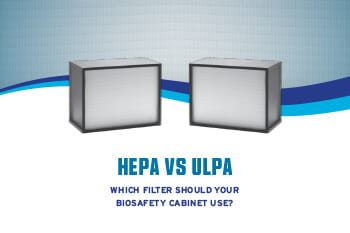
White Paper
HEPA versus ULPA Filters in Biosafety Cabinets
This document, "HEPA versus ULPA Filters in Biosafety Cabinets," is an invaluable resource for laboratories determining the most appropriate air filtration technology for their biosafety cabinets (BSCs). It thoroughly compares High-Efficiency Particulate Air (HEPA) and Ultra-Low Particulate Air (ULPA) filters, which are crucial for maintaining a contaminant-free environment in critical research settings. Detailing the operational mechanics of BSCs, including airflow dynamics and negative pressure creation, emphasizes the significance of selecting the right filter based on performance, cost, and specific laboratory needs. The guide also explores standards like NSF/ANSI 49 and EN12469, providing a foundation for understanding filter efficiency and the impact on BSC functionality. With insights into HEPA and ULPA filter design, testing standards, and practical considerations for laboratory applications, this document is a comprehensive guide for labs aiming to enhance safety, efficiency, and durability in their operations.
